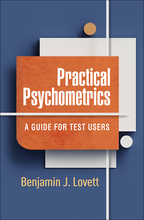Practical Psychometrics
A Guide for Test Users
Benjamin J. Lovett
HardcoverPaperbacke-bookprint + e-book
Hardcover
orderMay 19, 2023
ISBN 9781462552108
Price: $71.00 206 Pages
Size: 6" x 9"
Paperback
orderApril 18, 2023
ISBN 9781462552092
Price: $47.00 206 Pages
Size: 6" x 9"
e-book
orderApril 24, 2023
PDF and Accessible ePub ?
Price: $47.00 206 Pages
ePub is Global Certified Accessible
print + e-book $94.00 $56.40
orderPaperback + e-Book (PDF and Accessible ePub) ?
Price: 206 Pages
ePub is Global Certified Accessible
“The author’s objective was to explain basic psychometrics to test users in a way that is accessible, intuitive, concise, clinically relevant, and technically accurate. He succeeded in that effort….The book is well suited as a text for an introduction to testing course in a specialist-level school psychology program, or as a supplemental text for a doctoral level psychometrics course. In either case, the book’s nearly 200 pages would likely be assigned cover to cover…..This book makes a valuable contribution to the pursuit of best practices in psychoeducational assessment.”

—NASP Communiqué (review by Robert Lichtenstein, PhD)
“This well-written text offers a concise, clinically relevant guide to using psychometrically based tests in psychology, social work, counseling, and related areas. The author’s voice is clear and approachable, almost like he is speaking with you. Discussion of bias and fairness is particularly well done, and will help students to deconstruct the many issues that are involved when using psychometric instruments. I was particularly impressed with the discussion of norming and multicultural issues, as this topic can be dissentious. The exercises at the end of each chapter are effective and thoughtful; the way they span multiple professional areas helps to make the volume applicable to students across various training programs.”

—J. Gayle Beck, PhD, Emerita Chair of Excellence, Department of Psychology, University of Memphis
“It has been a struggle to find a resource that strikes the right balance of theory and applied practice to empower future practitioners with regard to test use, selection, and interpretation. Many of us have been clamoring for a resource like this for use in our master's-level programs! The presentation is incredibly accessible, and is anchored in a strong balance of practical, timely examples throughout.”

—Laura M. Spenceley, PhD, Dean, School of Education, State University of New York at Oswego
“The case examples are really helpful and the writing style very accessible.”

—Matthew K. Burns, PhD, Rose and Irving Fein Endowed Professor of Special Education, University of Florida; Assistant Director, University of Florida Literacy Institute
“Across eight chapters, Practical Psychometricsoffers a concise introduction to key terms, concepts, and research methods associated with mental measurement. The book achieves its goals of being readable, intuitive, clinically relevant, and technically accurate. Lovett’s writing is crystal clear, and his examples are vivid. This book covers a lot of ground and is well designed for graduate programs in school psychology, behavior analysis, social work, and counseling.”

—Randy G. Floyd, PhD, Professor and Chair, Department of Psychology, University of Memphis
—NASP Communiqué (review by Robert Lichtenstein, PhD)
“This well-written text offers a concise, clinically relevant guide to using psychometrically based tests in psychology, social work, counseling, and related areas. The author’s voice is clear and approachable, almost like he is speaking with you. Discussion of bias and fairness is particularly well done, and will help students to deconstruct the many issues that are involved when using psychometric instruments. I was particularly impressed with the discussion of norming and multicultural issues, as this topic can be dissentious. The exercises at the end of each chapter are effective and thoughtful; the way they span multiple professional areas helps to make the volume applicable to students across various training programs.”
—J. Gayle Beck, PhD, Emerita Chair of Excellence, Department of Psychology, University of Memphis
“It has been a struggle to find a resource that strikes the right balance of theory and applied practice to empower future practitioners with regard to test use, selection, and interpretation. Many of us have been clamoring for a resource like this for use in our master's-level programs! The presentation is incredibly accessible, and is anchored in a strong balance of practical, timely examples throughout.”
—Laura M. Spenceley, PhD, Dean, School of Education, State University of New York at Oswego
“The case examples are really helpful and the writing style very accessible.”
—Matthew K. Burns, PhD, Rose and Irving Fein Endowed Professor of Special Education, University of Florida; Assistant Director, University of Florida Literacy Institute
“Across eight chapters, Practical Psychometricsoffers a concise introduction to key terms, concepts, and research methods associated with mental measurement. The book achieves its goals of being readable, intuitive, clinically relevant, and technically accurate. Lovett’s writing is crystal clear, and his examples are vivid. This book covers a lot of ground and is well designed for graduate programs in school psychology, behavior analysis, social work, and counseling.”
—Randy G. Floyd, PhD, Professor and Chair, Department of Psychology, University of Memphis



